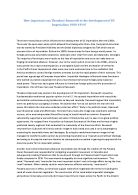On the other hand, actions prior to the Spanish American war showed that not all US presidents saw a right to intervene. In 1895, Cleveland refused to annex Hawaii even though he was being pressed by American planters. His condemnation of events on the island showed that he sided with the Anti-Imperialists; it demonstrated the view that, given America’s colonial past, they should not take over other countries by force. At this point, Cleveland went against what others may do by choosing a moral position rather than just bowing to economic pressure; due to the trade with Hawaii, it would have been advantageous for the US to have more control. The Hawaiian Queen had just been deposed and so it would have made it easy to annex Hawaii; the fact that this didn’t happen indicates that Cleveland did not have imperialistic ambitions.
However, another point showing clear US imperialism was their apparent intentions to stop at nothing to gain economic advantage. This was most obvious Roosevelt’s intervention in Panama in 1903; when the US government’s investment was threatened, they assisted a revolution and eventually got the land for just $10m with annual fee of $250,000. The sending of the USS Nashville to prevent Columbian interference showed Roosevelt’s lack of inhibition around the military. By seeing the area around the Panama Canal as rightfully theirs, the US showed immense arrogance and greed. As with the Spanish American war, there was no threat to their country, but the American government used the excuse of spreading democracy and freedom to assist themselves. Having control of such an important route was important for the US as this gave them influence over European trade. Therefore, these actions could be seen as building America’s position as a world power and increasing the dominance on their sphere of influence. This is linked to William Howard Taft’s ideas of ‘Dollar Diplomacy’ as this was also connecting foreign policy with trade and investment
Another example of American imperialism during this period were Taft’s ideas about using economic influence to expand the power of the US as an imperialist nation. As is demonstrated by the fact that American banks took over financial control of places such as Honduras, Haiti and Nicaragua, Taft thought expanding to new markets was essential. Whilst at first this wasn’t militaristic imperialism, it was the same idea of America extending their control over smaller countries. Whilst other president’s were more subtle about their reasons for international intervention, Taft made it clear that he was protecting US trade interests. Despite this policy not being entirely successful in areas such as Nicaragua, and resulting in the use of the military by 1909, it was still inspired by imperialistic aims and Taft defended his ideas as reducing the need for military intervention. As an example of how imperialism was achieved by more than just use of force, this shows that the US saw the building of an empire as important to all aspects of their politics: from foreign policy to economics.
In contrast to this, it could well be argued that Woodrow Wilson’s ‘Moral Diplomacy’ looked beyond US interests; he thought that whilst the US should defend democracy, it was important to defend the right to self-determination. This was exemplified by his apologies for Roosevelt’s actions during the Panama Revolution. In admitting that previous policy had been unjust, he challenged the image of America as aggressive and self-serving. He was one of the few presidents who had no imperialistic ambition and by having an anti-imperialist Secretary of State, Wilson sent a clear message that he didn’t follow the views of his predecessors. Whilst he did send troops to intervene in other conflicts, such as during the rebellion of Nicaragua in 1914, Wilson was always clear that the final aims were of self determination. This was markedly different to the attitudes of Taft as it was less about advancing American power and more about improving democracy across the world. Whether or not this was justified, it was an interventionist rather than an imperialist approach.
Finally, whilst a lot of Roosevelt’s actions seemed to be imperialistic, he also tried to reduce conflict without intervening. For example, he won the Nobel Peace Prize in 1906 for helping to negotiate the Treaty of Portsmouth. This supported his famous idea that in diplomacy you should “speak softly but carry a big stick”; whilst he was willing to use force, he still believed that peaceful solutions with greater self-determination were the better option. Winning the Nobel Peace Prize also demonstrates that, on the international stage, America were not judged as an imperialistic power. Instead US leaders were being recognised as having a positive influence on the world. Despite Roosevelt's aggressive ideas in some areas of foreign policy, at times like this he seemed to echo the progressivism he showed in domestic politics.
Overall it is clear that the United States was considerably an imperialist power by 1914. Whilst presidents had different ideologies, the outcome of their actions were very often imperialistic. The few occasions where imperialism wasn’t initially shown, such as in Hawaii and with Wilson’s moral diplomacy, in the end America resorted to defending their empire. The continued use of the military to maintain power also demonstrates that the ambition for control outweighed the ideology on which presidents were elected. Even though the Democrats tried to display themselves as focussed on the rights to self-determination, Democratic presidents showed as much foreign intervention as their Republican counter parts. To conclude, by 1914 the United States had demonstrated that they had ambitions for an empire and were not afraid to use any means to achieve it.








